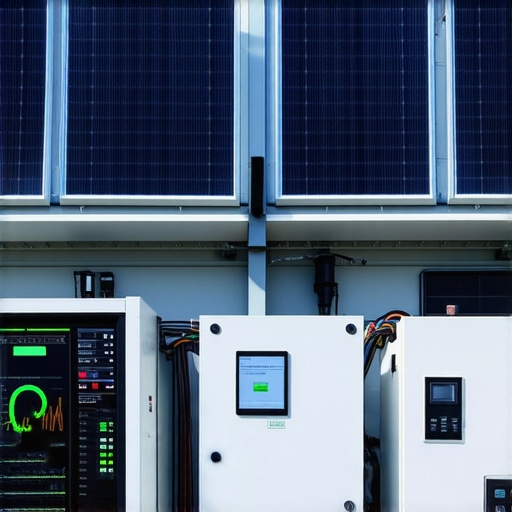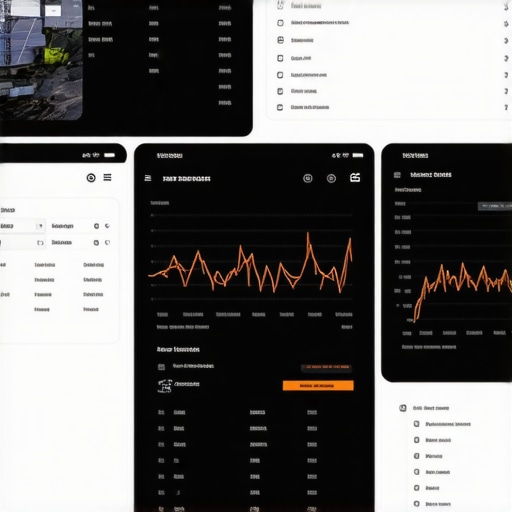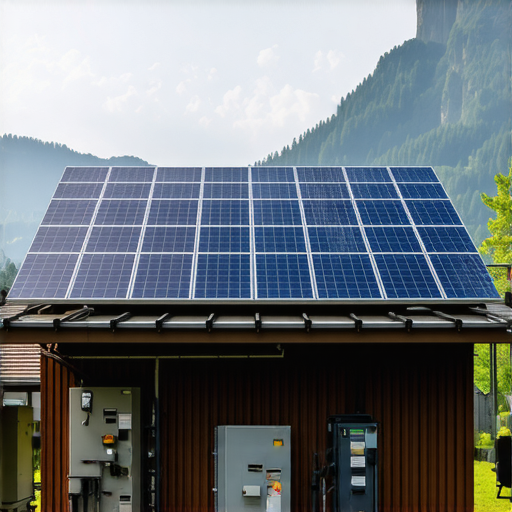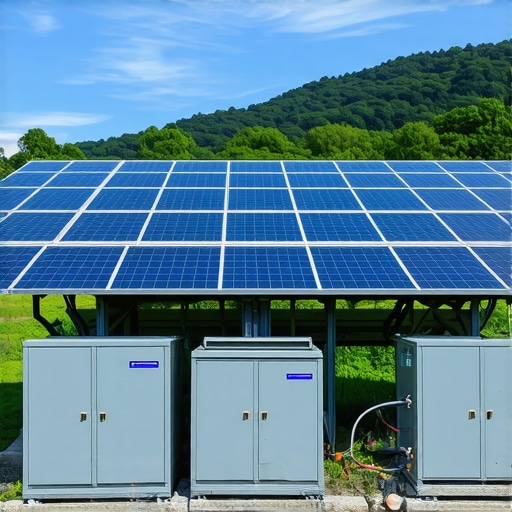Discovering the Power of Off-Grid Solar: My Unexpected Journey
I’ll never forget the day I decided to embrace off-grid living. Living in a remote area, I faced frequent power outages and rising electricity costs, which pushed me to explore alternative energy solutions. My first step was understanding the essentials of off-grid solar kits and how they could transform my lifestyle. This journey started with simple solar panels, but soon I realized that building a reliable battery bank was crucial for consistent power supply, especially during cloudy days or at night.
Designing My Perfect Off-Grid Solar System: What I Learned
As I delved deeper, I discovered that choosing the right components is vital. I began assessing my energy needs, calculating my daily consumption, and exploring different solar kits tailored for off-grid homes. I found that a combination of high-capacity batteries and efficient inverters could provide a seamless power experience. To maximize performance, I also researched inverter efficiency tips, which significantly improved my system’s reliability.
What Makes a Battery Bank Reliable? My Personal Insights
Building a battery bank was my biggest challenge. I wanted something durable, scalable, and capable of handling my energy demands. After experimenting with different battery types, I settled on lithium-ion batteries for their longevity and high energy density. I learned that proper maintenance and smart management are essential to extend battery life. If you’re considering a similar setup, I recommend reading comprehensive guides like this complete guide for a step-by-step process.
How Do I Ensure My Off-Grid System Is Future-Proof?
Is it possible to keep my solar system adaptable for future needs?
Absolutely. Flexibility is key. When I designed my system, I left room for additional batteries and solar panels, so I could scale up as my energy needs grew. Trends indicate that innovations like smarter energy management and improved storage solutions will dominate the future of off-grid solar, as highlighted in this insightful article. Staying informed helps me adapt and optimize my setup over time.
If you’re contemplating your own off-grid solar journey, I highly recommend consulting dedicated guides and participating in forums. Sharing experiences has been invaluable, and I encourage you to comment below with your plans or questions.
How Can Advanced Battery Technologies Enhance Your Off-Grid Solar System’s Longevity?
As an off-grid solar enthusiast, I constantly seek ways to improve system reliability and lifespan. The evolution of battery technology, especially the advent of solid-state batteries and enhanced lithium-ion variants, promises significant gains in energy density, safety, and lifespan. These innovations enable my system to handle higher charge/discharge cycles, minimizing replacement frequency and reducing long-term costs. For those interested in the latest developments, I recommend exploring resources like this comprehensive guide. Incorporating such cutting-edge batteries can be a game-changer for ensuring your off-grid setup remains robust for decades to come.
What Practical Steps Can You Take to Future-Proof Your Off-Grid System?
Designing with flexibility is essential. I always leave room for expansion—additional solar panels or batteries—so I can adapt as my energy demands evolve. Installing modular components and scalable controllers allows seamless upgrades without major overhaul. Additionally, integrating smart energy management systems helps optimize performance and prolong component life. Staying abreast of emerging trends, such as those discussed in this insightful article, keeps me informed about new storage solutions and intelligent system controls. These strategies collectively ensure my system remains adaptable to future needs, avoiding obsolescence and maximizing ROI.
How Do Smart Energy Management Systems Contribute to System Adaptability?
Smart energy management systems (EMS) are pivotal in maintaining a resilient off-grid setup. They monitor real-time performance, prioritize loads, and optimize battery charging cycles. For example, when cloud cover reduces solar input, the EMS intelligently adjusts power usage, protecting batteries from over-discharge. As technology advances, integrating AI-driven EMS can further refine these operations, providing predictive analytics and automated adjustments. This level of control not only safeguards hardware but also enhances overall efficiency. If you’re considering upgrading your system, exploring options like guides on selecting the right solar kit can help you make informed decisions. Such systems are vital for ensuring your off-grid system remains resilient amidst changing environmental conditions and growing energy needs.

Image depicting modern smart energy management system interface with graphical data and controls for off-grid solar systems.
Reflecting on the Nuances of Off-Grid Solar: My Personal Growth and Future Horizons
As I look back on my journey into off-grid solar, I realize that each step has not only been about building a reliable energy system but also about transforming my mindset and understanding of sustainable living. The deeper I dive, the more I appreciate the intricate dance between technology, environment, and personal resilience. This path has challenged me to think beyond simple solutions and embrace a more holistic approach, integrating innovation, adaptability, and long-term vision.
How Do Cutting-Edge Battery Technologies Shape My Off-Grid Future?
One of the most exciting developments I’ve explored is the advent of solid-state batteries. Their promise of higher safety standards, increased energy density, and longer cycle life could revolutionize off-grid energy storage. I’ve been following research from leading institutions like QuantumScape, which indicates that these batteries could significantly extend the lifespan of my system and reduce maintenance costs over time. Integrating such advanced technology requires a thoughtful approach, ensuring compatibility with existing components and anticipating future upgrades. I see this as a pivotal step toward creating an off-grid setup that not only meets current needs but is prepared for decades of reliable service.
What Are the Challenges of Scaling and Customizing My Off-Grid System?
Scaling an off-grid solar system isn’t merely a matter of adding more panels or batteries; it’s about maintaining harmony between components and ensuring that each part complements the whole. My experience has shown that as I scale up, I must pay closer attention to system balancing, inverter capacity, and energy management. Customization becomes essential—tailoring the setup to specific needs, whether it’s powering a workshop, growing a garden, or supporting a small home office. This process has taught me patience and the importance of meticulous planning. Consulting detailed guides like this comprehensive resource has been invaluable, helping me avoid pitfalls and optimize my system’s performance.
How Can I Leverage Smart Technologies to Enhance System Resilience?
Smart energy management systems (EMS) are not just tools—they’re becoming integral partners in my off-grid lifestyle. By incorporating AI-driven EMS, I can analyze real-time data, predict potential issues, and automatically adjust loads and charging cycles. This dynamic responsiveness creates a resilient environment that adapts to weather fluctuations and changing energy demands. For example, during unexpected cloudy days, the system intelligently prioritizes essential loads, conserving stored energy for critical needs. This intelligent orchestration has transformed my approach from reactive to proactive, giving me peace of mind and greater control over my energy ecosystem. Exploring advanced EMS options, such as those discussed in this guide, continues to inspire me to push the boundaries of what’s possible with off-grid technology.
Every innovation, every tweak, and every lesson learned deepens my connection to this sustainable lifestyle. I encourage anyone on a similar path to explore emerging technologies, share their experiences, and stay curious. The journey is ongoing, and the possibilities are limitless. If you’ve had your own breakthroughs or challenges, I’d love to hear your story—please share your insights or questions in the comments below. Together, we can forge a future where off-grid living is more reliable, efficient, and inspiring than ever before.

Image depicting a modern AI-driven energy management system interface with graphical data and controls for off-grid solar systems.
Unlocking the Potential of Solid-State Batteries: My Personal Perspective on Future-Proofing Off-Grid Systems
As I continue to refine my off-grid solar setup, the advent of solid-state batteries stands out as a game-changing development. These batteries, with their promise of enhanced safety, higher energy density, and longer cycle life, are poised to revolutionize energy storage solutions for sustainable living. Drawing insights from pioneering research, such as the work conducted by QuantumScape, I see a future where my system could benefit immensely from these innovations, reducing maintenance costs and extending operational longevity.
Implementing solid-state technology isn’t merely about upgrading components; it’s about reimagining the entire energy ecosystem. The increased safety standards—thanks to the solid electrolyte—minimize risks associated with thermal runaway, a common concern with lithium-ion batteries. Moreover, their higher energy density allows for more compact and efficient storage solutions, critical for those of us living in remote locations with limited physical space.
However, integrating these cutting-edge batteries requires careful planning. Compatibility with existing inverters, charge controllers, and management systems must be evaluated. I’ve found that collaborating with manufacturers and staying informed through technical papers helps anticipate potential challenges. The transition isn’t instantaneous, but the long-term benefits—reliability, safety, and cost-effectiveness—make it a worthy investment. For those interested in exploring these advancements, I recommend consulting authoritative sources like this comprehensive guide, which offers valuable insights into integrating emerging technologies into off-grid setups.
How Can Embracing Advanced Battery Technologies Transform My Off-Grid Lifestyle?
Adopting next-generation batteries isn’t just a technical upgrade; it’s a lifestyle enhancement. Extended cycle life means fewer replacements, reducing both costs and environmental impact. Improved safety features provide peace of mind, especially when managing energy in isolated environments. Additionally, higher energy density enables the design of more compact, portable, and efficient systems, empowering me to explore new horizons—be it expanding my living space or supporting additional renewable sources like wind or hydro.
Furthermore, advancements in battery management systems (BMS) are crucial. Smarter BMS, integrated with AI and IoT sensors, can predict battery health, optimize charging cycles, and alert me to potential issues before they escalate. This proactive approach aligns perfectly with my ethos of sustainable, resilient living. As innovations continue to emerge, I remain committed to integrating the latest technologies, ensuring my off-grid system remains robust for decades. I invite fellow enthusiasts and innovators to share their experiences and insights—together, we can push the boundaries of off-grid energy independence and resilience.
Engaging deeply with these advancements has been a rewarding journey. If you’re curious about how to incorporate next-gen batteries into your setup or want personalized advice, feel free to reach out through my contact page. Let’s explore how these exciting innovations can help us achieve truly sustainable and self-sufficient lifestyles.
Things I Wish I Knew Earlier (or You Might Find Surprising)
Understanding the True Cost
When I first embarked on my off-grid solar journey, I underestimated how much initial investment and ongoing maintenance would be involved. It’s not just about buying solar panels; the hidden costs of batteries, inverters, and future upgrades can add up quickly. Learning this the hard way taught me to plan a more realistic budget from the start.
The Power of Flexibility
One thing I discovered is that designing a system with future expansion in mind is crucial. Leaving room for additional batteries or panels means I can adapt as my energy needs grow, without overhauling everything. Flexibility has saved me time and money in the long run.
The Importance of Regular Maintenance
Maintaining my system might seem tedious, but I found that regular checks on batteries and connections prevent costly repairs and system failures. A little effort today can mean reliable power for years to come.
Innovations Are Moving Fast
The technology in off-grid solar is evolving rapidly. From solid-state batteries to smarter energy management systems, staying informed has allowed me to incorporate cutting-edge solutions that improve efficiency and safety. I wish I had started exploring these innovations sooner!
Community Is Key
Joining forums and local groups has been invaluable. Sharing experiences and troubleshooting with others has broadened my understanding and made me confident in managing my system. Don’t underestimate the power of community support!
Resources I’ve Come to Trust Over Time
- QuantumScape: Their research on solid-state batteries has opened my eyes to future energy storage possibilities. It’s a trusted source for cutting-edge battery tech.
- Solar Power World: An excellent site for industry news, product reviews, and technical guides. It’s been my go-to for staying updated on solar innovations.
- Off-Grid Solar Resources: The comprehensive guides on this site helped me plan and scale my system efficiently. Highly recommended for beginners and veterans alike.
Parting Thoughts from My Perspective
Reflecting on my off-grid solar adventure, I realize that the most valuable lesson is the importance of continuous learning and adaptability. The technology and best practices are evolving, and staying informed allows us to build systems that are not only reliable but also future-proof. Personally, I believe that embracing innovation, community, and careful planning can turn a challenging project into a rewarding lifestyle choice. If this resonates with you, I’d love to hear your thoughts or experiences. Feel free to share your journey in the comments or reach out—I believe we all benefit from shared knowledge and enthusiasm for sustainable living.

